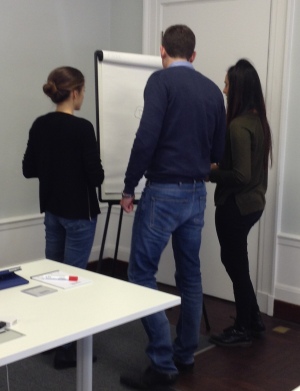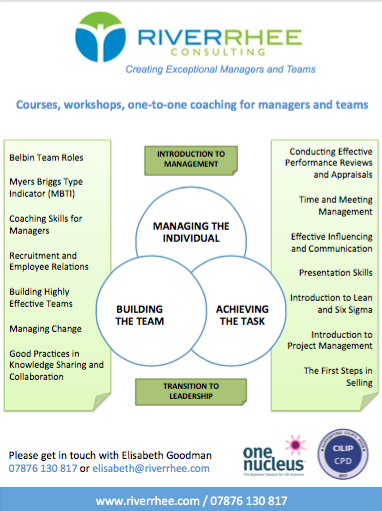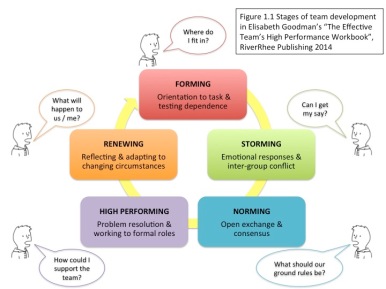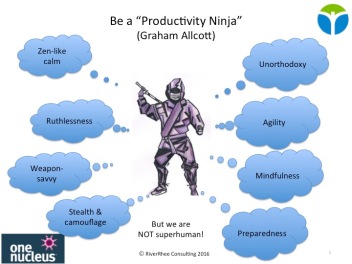By Elisabeth Goodman, 11th December 2018
As readers of this newsletter, and of my separate blog will know, I have been making my way through Daniel Goleman et al’s twelve Building Blocks of Emotional Intelligence. I had the sixth one, on empathy, all lined up to read when I came across The Problem with Empathy, shared by one of my connections on LinkedIn.
The gist of the post is that we should be careful about getting onto the bandwagon of what is trendy in the management world, and make sure that we do not get so absorbed in the emotions associated with empathy as to lose our critical thinking. The author also suggested that the term ‘compassion’ might be a more appropriate one to use.
I still believe, based on RiverRhee’s recent and ongoing experiences in working with our clients that, whatever we call it, empathy is still (as I described it in a previous post) a “magical leadership ingredient”.

#6: Empathy in Building Blocks of Emotional Intelligence, by Daniel Goleman et al. Key Step Media, 2017
Daniel Goleman and his co-authors have some excellent insights to share with us on this topic, and so it seems like a fitting one on which to focus in RiverRhee’s last newsletter for 2018.
(Readers interested in our programme of courses for 2019 will find this listed at the end of this newsletter.)
What is empathy?
According to Goleman et al, empathy is one of the two components of social awareness. (The other is organisational awareness, which I have written about previously). It is about tuning into what others are thinking and feeling.
Empathy also, as everyone seems to agree, combines both cognitive (or intellectual) understanding and emotional understanding. In fact, different parts of the brain are involved in each of these. The key, as both Richard J Davidson and Vanessa Druskat explain, is to be able to turn this empathy, or compassion, from caring into action.
Most importantly: leaders and team members who are able to balance empathy with constructive feedback will be far more effective than those who are simply able to relate to others’ emotions.
Why is empathy so important?
Empathy is about showing the other person that they have been heard and understood. Knowing that you care about them could help the other person feel more motivated. And having this level of insight will help you to communicate with and work with the other person in a way that will be more effective.
Explained in these terms, empathy really does seem to be a key ingredient for all the important activities and situations that arise in our day-to-day interactions with others.
For line and project managers, leaders, and team members empathy could make all the difference in terms of being able to influence, motivate, mentor and inspire. It should help with managing conflict, collaborating in teams, and working across cultures.
How to develop your ability to be empathetic?
Goleman suggests that we are more likely to be good at being empathetic if we have strong emotional self-awareness.

Tuning in. Illustration based on Richard Boyatzis chapter in #6: Empathy – Building Blocks of Emotional Intelligence
Beyond that, Richard Boyatzis suggests we practise ‘tuning in’. We can develop our observational skills, and compare them with what people tell us when we ask open questions such as:
- What do you think about this?
- How do you feel about this?
We can also “widen our circle of compassion”, as Richard J. Davidson suggests, by taking the same level of interest in our co-workers, as we take for our family and friends. And we can actively listen to them when in one-to-one discussions, or in meetings, rather than writing notes or looking at our electronic devices.
George Kohlrieser takes this a step further. He suggests that we could learn to open up to our own and others’ emotions (if we are not already doing so). Apparently he asks leaders in his workshops to create a timeline of their lives that include five of the most painful, and five of the most positive of their experiences. He then has them tell each other the story of one of these.
Whether or not you agree with this level of revelation, there is something to reflect upon here in terms of what makes a leader come across as more authentic, credible or trustworthy, and better able to tune into and act upon their understanding of others.
NOTES
Blogs on other booklets in the Building Blocks of Emotional Intelligence series:
- 1: Emotional Self-Awareness
- 2: Emotional Self-Control
- 3: Adaptability
- 4: Achievement Orientation
- 7: Organizational Awareness
- 8: Influence
- 9: Coaching and Mentoring
- 10: Conflict Management
- 11: Teamwork
RiverRhee’s schedule of courses for 2019 can be accessed on our web site and is also shown here:
For those on a management journey:
- One-day Supervisors’ course. 10th January 2019. If all you want is one day of training to get you started
- Performance Reviews & Appraisals (for supervisors and line managers). Tuesday 15th January. Note that this is a half-day course: 13:00 – 16:30. It reflects the content of RiverRhee’s management module on Performance Management and Development and emphasises the two-way nature of this topic.
- Introduction to Management. Tuesday 29th to Thursday 31st January (FULL); also Tuesday 12th to Thursday 14th March. RiverRhee’s flagship course for new managers and those who are more experienced but have never had any formal training.
- Transition to Leadership. Tuesday 5th February. This one-day course is targeted at managers who have attended RiverRhee’s 3-day course, and those who have recently moved to, or are planning to move to a more senior leadership role.
- Coaching Skills for Managers. 11th June 2019. To further develop your coaching skills
- Recruitment and Interview Skills* Essential skills for managers involved in the recruitment process
For day-to-day process and project management:
- Introduction to Lean and Six Sigma*. Explore how you can gain up to 20% savings by improving your processes
- Introduction to Project Management*. All the basics for managing your projects effectively
For essential capability and confidence building skills in other aspects of your work:
- Assertiveness. Tuesday 5th March. This is one of RiverRhee’s newer courses to complement their courses and modules on Effective Influencing and Communication, and on Dealing with Difficult Situations.
- First steps in selling* Building effective relationships with your customers when selling is not necessarily your thing
- Presentation skills*
- Managing change* How to deal with and lead change in your organisation
* Please enquire for dates in 2019.
All of RiverRhee’s courses can be scheduled on demand, either to run in-house for your company, or to publicise as an open course for other delegates. We can also explore most topics in one-to-one coaching sessions.
Do get in touch if you would like to find out more about RiverRhee, and how we can help you to create exceptional managers and teams. See the RiverRhee Consulting website or e-mail the author at elisabeth@riverrhee.com or contact Elisabeth on 07876 130 817.
































